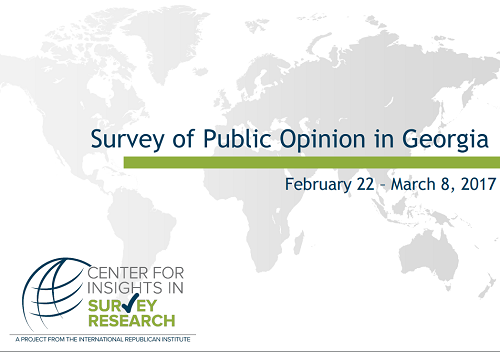Political Ratings and Public Attitudes in IRI-commissioned Poll

Survey of Public Opinion in Georgia, IRI, 2017
A recent public opinion poll shows the ruling Georgian Dream-Democratic Georgia in lead with 30% support among likely voters, followed by the United National Movement and the newly-established Movement for Liberty-European Georgia with 15% and 8%, respectively.
The poll, released on Tuesday, was conducted by Baltic Surveys/The Gallup Organization for the International Republican Institute (IRI) between February 22 and March 8, 2017. The survey was conducted through nationwide face-to-face interviews (excluding occupied territories) with 1,501 respondents and has a margin of error plus, minus 2.5%.
GDDG, whose nationwide party-list vote results stood at 48.68% in the October 2016 Parliamentary Elections, has 30% support among likely voters (up from 21% in 2016 and down from 36% in 2015), according to the part of the public opinion survey, which examines voting intentions of respondents for the upcoming municipal elections.
UNM has 15% support among likely voters (down from 20% in 2016), followed by the Movement for Liberty-European Georgia – 8%; the Labor Party – 6% (down from 8%); the Alliance of Patriots of Georgia – 4% (same as a year ago), and the Free Democrats – 3% (down from 13%). 13% of respondents said they would vote for none of the parties and 19% either did not know or refused to answer.
The survey also examines favorability rating of politicians, where President Giorgi Margvelashvili and Healthcare Minister Davit Sergeenko lead with 67% and 65%, with their unfavorable ratings standing at 30% and 28%, respectively.
They are followed by Prime Minister Giorgi Kvirikashvili and MP Davit Bakradze, leader of the European Georgia party, and former Parliamentary Chairman Davit Usupashvili with 55%, 50% and 48% favorability ratings, respectively.
Among opposition politicians Bakradze and Usupashvili have the highest favorability rating, followed by Shalva Natelashvili of the Labor Party with 39%.
Energy Minister Kakha Kaladze has 37% favorability rating, followed by Justice Minister Tea Tsulukiani – 35% and Parliamentary Chairman Irakli Kobakhidze – 32%.
These political ratings are part of a broader public opinion survey, which also looks into public attitudes towards multiple issues related to domestic politics and foreign affairs.
92% of respondents think that the President of Georgia should be elected through popular vote and only 5% supports the GDDG-proposed parliamentary selection of the President.
65% of respondents think that Georgia is moving in the “wrong direction”, down from 70% in 2016 and up from 55% in 2015. 21% think that the country is moving in the “right direction,” up from 16% in 2016, and 14% either did not know or refused to answer.
According the recent poll, the Georgian Orthodox Church enjoys the highest favorability rating with 88%, compared to 89% in 2016, followed by the Georgian army – 86%, statistically the same level recorded a year ago, Georgian media – 74%, same as a year ago; police – 59%, up from 50%; Office of the President – 55%, up from 46%; education system 52%, up from 50%; central election commission – 40%, up from 38%; Parliament – 39%, up from 34%; Office of the Ombudsman – 39%, up from 29%; Cabinet of Ministers – 38%, up from 36%; courts – 30%, up from 27%.
Foreign Affairs
90% of respondents are supportive of Georgia’s European Union membership (up from 85% in 2016) and support for joining NATO stands at 82% (up from 79% in 2016), according to the poll.
23% of respondents believe that Georgia’s foreign policy approach should be only “pro-EU/pro-Western,” while 53% think that it should be “pro-Western," but the country should, simultaneously, "keep up relations with Russia.” 12% want Georgia to be “pro-Russian but remain an ally of the EU/the West” and 3% would like to see Georgia "pro-Russian" only.
Georgian government’s handling of relations with Russia is assessed positively by 54% of respondents (down from 59% in 2016) and negatively by 35% (up from 29% in 2016); 73% of respondents think that Russia is a “threat” (up from 71% in 2016).
Media
Georgian television channels remained the main source of information about current international affairs for 93% of respondents (94% in 2016), followed by Georgian internet news and Facebook – 21% and 13%, respectively (15% and 9% in 2016).
7% of respondents identified Russian TV as the main source of information on international affairs, which is down by 2% compared to 2016.
80% of respondents said that they regularly watch Imedi TV, up by 2% compared to 78% in 2016. The figure for Rustavi 2 TV, which led the list last time with 80%, declined to 78%. Maestro and the Georgian Public Broadcaster have 28% each.
44% of respondents trust Rustavi 2 (down from 46% last year), while 33% trust Imedi TV (up from 25% last year).
This post is also available in: ქართული (Georgian) Русский (Russian)